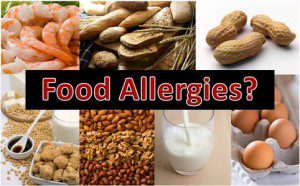
Whether it be a whole food group like carbohydrates or ingredients such as wheat or milk, increasing numbers of people are avoiding foods on the basis of an over the counter test or self-diagnosis of their symptoms.
But how do you know if you have an allergy or intolerance and what are the symptom?
Allergy
A true food allergy is relatively uncommon, but the symptoms can be serious or even life threatening. One of the most common foods to be allergic to is nuts. People with a nut allergy experience a range of symptoms from itching on the skin or a rash through to swelling in the mouth and throat which can stop breathing. This sort of severe reaction is called an anaphylactic shock, and can kill.
Other foods which can provoke this sort of reaction in adults or children are fruits such as strawberries or kiwi, eggs or milk. People who have a food allergy have to take care to avoid eating anything prepared with the food they are allergic to, and in severe cases they will have to avoid anything prepared in a factory where that ingredient is used.
Treatment of an allergic reaction is managed by antihistamine tablets and creams for a less severe case, but for more serious reactions hospital treatment will be necessary. Scientists are still unsure why some people react so severely to certain foods, but people who suffer with eczema, asthma or other allergies are more likely to have some sort of food allergy.
Intolerance
Food intolerance is a much more common concept than that of an allergy. With an allergy, the immune system goes into overdrive, reacting against the food which it perceives as a threat to the body. With an intolerance, the reaction does not involve the immune system at all.
One of the most common intolerances is to lactose, the sugar found in cows milk. Someone who is lactose intolerant and who drinks milk may find they experience problems with their bowels, bloating or constipation. Other foods which people can be intolerant to include alcohol, chemicals used as preservatives or colourings and caffeine. Intolerances can vary by ethnic group. 10 – 15% of the population with European origins are intolerant to lactose, but as many of 90% of people with African roots have lactose intolerance.
Coeliac Disease
One of the foods which many people feel they are intolerant to is gluten, the protein found in wheat. A true intolerance to gluten is known as coeliac disease, and this can cause a range of symptoms including bloating, pain in the abdomen, weight loss, diarrhea and slow growth in children.
Coeliac disease affects around 1% of the population and the symptoms can vary in severity. Diagnosis is by blood test, and sometimes a gut biopsy. Coeliac disease is underdiagnosed as many people with very mild symptoms may put their discomfort down to other factors such as irritable bowel disease (IBS) or a persistent vomiting bug.
Coeliac disease sufferers have to cut gluten out of their diet completely, but this has become simpler in recent years with manufacturers bringing ranges of gluten free pasta, bread and other baked products to the market.
Self-diagnosis
Food allergy and intolerance is the current hot topic in the world of nutrition, and a whole industry has sprung up around home testing kits, especially for gluten intolerance. Many of these kits are not very scientific, and give no guidance as to what the patient should do if they feel they are intolerant to gluten.
People experiencing symptoms which may indicate a food intolerance should first consult their family doctor, then try to follow an elimination diet whereby the food thought to be causing a reaction is eliminated for a few weeks to see if any improvement in symptoms is noted. It may take several months of eliminating various foods to get to the bottom of what is causing any problems. It can be damaging nutritionally to cut out entire food groups without a reasonable replacement, so any changes to diet should be done under the guidance of a trained nutritionist or a food intolerance specialist doctor.
